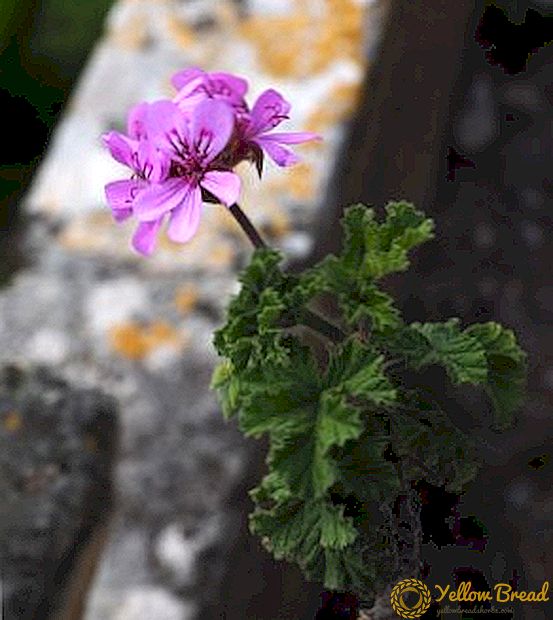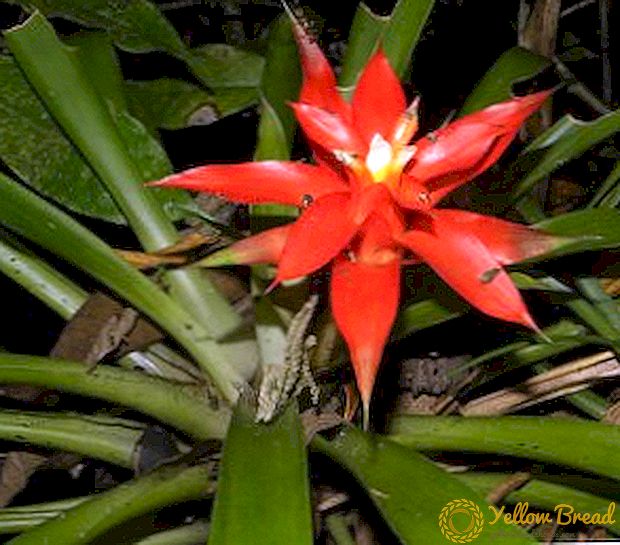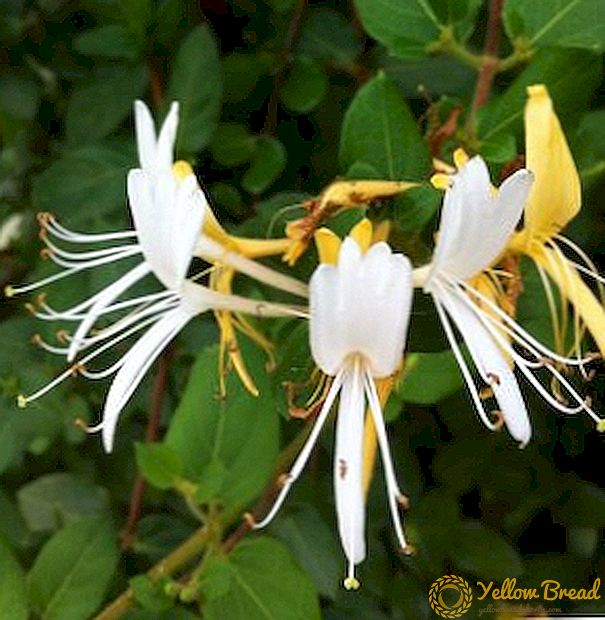 Among ferns, such a flower as adiantum is a plant whose habitat is in temperate subtropical zones, as well as in the tropics, is very popular.
Among ferns, such a flower as adiantum is a plant whose habitat is in temperate subtropical zones, as well as in the tropics, is very popular.
In the wild, it can often be found in the Caucasus Mountains, on the expanses of the Asian plains and on the Crimean peninsula. Often the habitat of its habitat become areas that are close to various reservoirs: streams, mountain rivers and lakes.
This flower is particularly popular among gardeners, who appreciate it for its outstanding external characteristics. In this article you will find comprehensive information on the various types of this fern.
- Venerin hair
- Beautiful
- Large leaf
- Stop-shaped
- Finely toed
- Gentle
- Nodular
- Ruddy
- Transparent
- Venustum
Venerin hair
Adiantum venerin hair - a flower that is most popular among gardeners in connection with its extraordinary aesthetic qualities, the exclusivity of which you can see by looking at his photo.
This plant is a perennial, the rhizome of which has a short creeping shape, additionally framed by narrow black shades. Height, as a rule, does not exceed 60 cm. Petioles containing leaves are black-brown, thin, 15 to 25 cm long.
The leaves are a pale green shade, about 3 cm long and 2 cm wide, with rather thin petals, delicate to the touch, obovate, at the base - wedge-like and fan-shaped at the top. 
Beautiful
This type of fern in nature can often be found near water bodies in Australia and New Zealand. Often grown as a decorative species, especially well-suited for breeding in rooms with temperatures approaching 25-30 ° C.
It has a creeping thin root, often located just a few centimeters deeper than the surface of the earth. Leaflets of the first order, the length of which is up to 60 cm, and the width varies within 40-45 cm, triangular, three or four plumose.
The leaves of the second order are of a dark green color, grassy, resemble a rhombus in shape, length is 2 cm, width is up to 1 cm. The upper part of the leaves ends with a frame containing young spores. Scapes somewhat rough to the touch, up to 50 cm long. 
Large leaf
This type of fern can often be found in the tropical zones of Central and South America. Well suited for decorating lawns and drawing up flower ensembles, thanks to large leaves of unusual shape.
Large-leafed adiantum is a perennial fern, whose height varies from 30 to 50 cm. Leaves that have a special pointed segment on the cut of which small strips of ripening spores are placed show recognition of this plant.
In addition, it is notable for the fact that its young foliage has a pinkish shade, and only after some time does it turn light green. 
Stop-shaped
Stopant-shaped adiantum is primarily known for being a rather cold-resistant culture, therefore it is the best fit for cultivation in outdoor gardens.
This type of fern has leaves of a bright green shade, flat, with thin dark-colored rods, twice pinnate and symmetrically located.
The upper edge of the leaf is decorated with segments that have a somewhat split appearance, which contain ripening spores. Mature fern can reach sizes up to 60 cm. Rhizome rather thick, superficially located. 
Finely toed
This species of this flower is also known as small hair. In the wild, it can be found in the African mountains, where it rises up to the snowiest lines, in the open spaces of India, on the peaks of Australia, in parts of the island of Madagascar and in New Zealand. Widely cultivated as a houseplant.
This plant has a thin creeping, branched root, from which strong petioles, covered with small bristles, whose length reaches 35 cm, depart.
The leaves of the second order are diamond-shaped, up to 2 cm long and about 0.5 cm wide, with fluffy bristles located on both sides.Along the edges of the leaves of the second order are densely located sporangia. 
Gentle
The habitat of its habitat is the tropical part of America, as well as the archipelagoes of the Lesser and Greater Antilles. This species is known to be well-suited for growing for ornamental purposes.
The plant is equipped with a short, creeping, superficial rhizome. It has leaves in the shape of feathers, the length of which reaches 70 cm, and its width is about 50 cm.
Second-order leaves resemble the wedge shape at the base and are wide-edge closer to the upper edge, are placed on the petioles, which are mostly dark black in color, reaching a height of 30 cm. 
Nodular
It differs from its counterparts in that it has a more grassy-looking form. It is recommended to use for the purpose of gardening warm semi-dark rooms with windows that are oriented to the west, east or north side.
The height of this flower does not exceed 70 cm. The color of the leaves is green, the shape is round, on the edge plate of each leaf there is a jaggedness in which there are ripening spores. The leaves are placed on thin stalks, up to 20 cm long, green. The diameter of each sheet can reach up to 7 cm. 
Ruddy
It belongs to one of the most used types of adiantum in landscape gardening. Most often in the natural environment it can be found in South America.
At the disposal of modern gardeners now there are several varieties of this type of fern, the most popular of which is adiantum frarans.
Adiantum Ruddy is a fern that stands out for its creeping leaves with wedge-shaped segments that are framed by a round edge. The slices of each sheet do not exceed 1 cm in length.  The leaves themselves are quite large in size.reach a length of 45 cm, are placed on drooping, rather thin petioles, which have a dark brown or black tint all over, except for the root zone, where they are greenish.
The leaves themselves are quite large in size.reach a length of 45 cm, are placed on drooping, rather thin petioles, which have a dark brown or black tint all over, except for the root zone, where they are greenish.
Transparent
This type of adiantum is a grassy flower, the height of an adult plant varies from 35 to 40 cm, the base of the leaves is double-pinnate, becoming feathery along the way.
His fronds have a length of about 15-25 cm and a width of about 3-4 cm, are placed on thin petioles up to twenty centimeters in size with smooth leaves of oval configuration of a pale green shade. 
Venustum
Homeland of this species is Nepal and Kashmir. This plant, despite its rather attractive appearance, did not find widespread use in our latitudes due to quite specific care needs and growing conditions.
It grows in the form of a shrub that forms narrow leaves approximately 20 cm long. Leaves rather sparse, light green shade, a little pointed form, hang down from stalks.
The leaves become light brown after the first frost. Scapes to which leaves are attached have a black-purple color.  So, the fern will serve as a magnificent decoration of your garden or home environment. We hope that this article will help you in choosing the right type of ferns, which will best be able to meet your needs.
So, the fern will serve as a magnificent decoration of your garden or home environment. We hope that this article will help you in choosing the right type of ferns, which will best be able to meet your needs.






